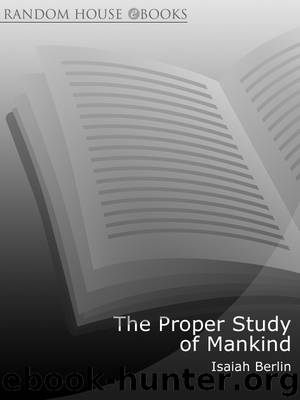The Proper Study of Mankind by Isaiah Berlin

Author:Isaiah Berlin [Berlin, Isaiah]
Language: eng
Format: epub
ISBN: 9780712673228
Publisher: Random House
Published: 0101-01-01T00:00:00+00:00
THE DIVORCE BETWEEN THE SCIENCES AND THE HUMANITIES
I
MY SUBJECT IS the relation of the natural sciences to the humanities: more particularly, a growing tension between them; and especially the moment when, it seems to me, the great divorce between them, which had been brewing for some time, became clear for all who had eyes to see. It was not a divorce between 'two cultures': there have been many cultures in the history of mankind, and their variety has little or nothing to do with the differences between the natural sciences and the humanities. I have tried but altogether failed to grasp what is meant by describing these two great fields of human enquiry as cultures; but they do seem to have been concerned with somewhat different issues, and those who have worked and are working in them have pursued different aims and methods – a fact which, for better or for worse, became explicit in the eighteenth century.
I begin with a tradition in which many eminent scientists today still stand: the tradition of those who believe that it is possible to make steady progress in the entire sphere of human knowledge; that methods and goals are, or should be, ultimately identical throughout this sphere; that the path to progress has been, as often as not – or perhaps a good deal more often – blocked by ignorance, fantasy, prejudice, superstition and other forms of unreason; that we have in our day reached a stage when the achievements of the natural sciences are such that it is possible to derive their structure from a single integrated set of clear principles or rules which, if correctly applied, make possible indefinite further progress in the unravelling of the mysteries of nature.
The approach is in line with a central tradition in Western thought which extends back at least as far as Plato. It appears to me to rest on at least three basic assumptions: (a) that every genuine question has one true answer and one only: all the others being false. Unless this is so, the question cannot be a real question – there is a confusion in it somewhere. This position, which has been made explicit by modern empiricist philosophers, is entailed no less firmly by the views of their theological and metaphysical predecessors, against whom they have been engaged in long and uncompromising warfare. (b) The method which leads to correct solutions to all genuine problems is rational in character; and is, in essence, if not in detailed application, identical in all fields, (c) These solutions, whether or not they are discovered, are true universally, eternally and immutably: true for all times, places and men: as in the old definition of natural law, they are ‘quod ubique, quod semper, quod ab omnibus creditum est’.1
Opinions within this tradition have, of course, differed about where the answers were to be sought: some thought they could be discovered only by specialists trained in, let us say, Plato’s dialectical method, or Aristotle’s more empirical types of
Download
This site does not store any files on its server. We only index and link to content provided by other sites. Please contact the content providers to delete copyright contents if any and email us, we'll remove relevant links or contents immediately.
| Anarchism | Communism & Socialism |
| Conservatism & Liberalism | Democracy |
| Fascism | Libertarianism |
| Nationalism | Radicalism |
| Utopian |
The Secret History by Donna Tartt(16627)
The Social Justice Warrior Handbook by Lisa De Pasquale(11489)
Thirteen Reasons Why by Jay Asher(7788)
This Is How You Lose Her by Junot Diaz(5775)
Weapons of Math Destruction by Cathy O'Neil(5038)
Zero to One by Peter Thiel(4824)
The Myth of the Strong Leader by Archie Brown(4789)
Promise Me, Dad by Joe Biden(4449)
Beartown by Fredrik Backman(4420)
Stone's Rules by Roger Stone(4417)
How Democracies Die by Steven Levitsky & Daniel Ziblatt(4399)
The Fire Next Time by James Baldwin(4343)
100 Deadly Skills by Clint Emerson(4079)
A Higher Loyalty: Truth, Lies, and Leadership by James Comey(4033)
Rise and Kill First by Ronen Bergman(4012)
The David Icke Guide to the Global Conspiracy (and how to end it) by David Icke(3883)
The Farm by Tom Rob Smith(3872)
Secrecy World by Jake Bernstein(3783)
The Doomsday Machine by Daniel Ellsberg(3731)
